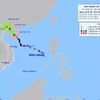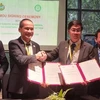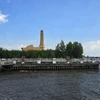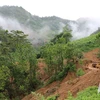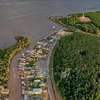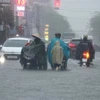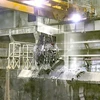To counter the growing threat of climate change, the Mekong Delta is expected to refine policies and plans in response to its severe consequences, especially rising sea level and salinity intrusion.
It is a must to come up with mechanisms to attract more investment, especially those using eco-friendly technology and energy, delegates made the call at a workshop in Hanoi on August 2.
They asked for all possible resources to plant mangrove forests and protect coastlines in case a typhoon makes a hit.
To adapt themselves to the changing climate, regional localities should further spread pilot projects and models under the ongoing national target programme to respond to climate change, they said.
Rising sea levels and a changing river course both contribute to salinity intrusion in the region. As the sea level rises, more salt water enters into the farmland, especially during times when high tides are stronger.
Covering an area of about 3.96 million hectares, the Mekong Delta is home to more than 22 million residents who mainly live on farming.
The region also suffers floods, drought and unusual weather patterns each year.-VNA
It is a must to come up with mechanisms to attract more investment, especially those using eco-friendly technology and energy, delegates made the call at a workshop in Hanoi on August 2.
They asked for all possible resources to plant mangrove forests and protect coastlines in case a typhoon makes a hit.
To adapt themselves to the changing climate, regional localities should further spread pilot projects and models under the ongoing national target programme to respond to climate change, they said.
Rising sea levels and a changing river course both contribute to salinity intrusion in the region. As the sea level rises, more salt water enters into the farmland, especially during times when high tides are stronger.
Covering an area of about 3.96 million hectares, the Mekong Delta is home to more than 22 million residents who mainly live on farming.
The region also suffers floods, drought and unusual weather patterns each year.-VNA

